Advantages of Outpatient Drug Rehab
Advantages of outpatient drug rehab include flexible scheduling, lower costs, and continuous home and community support. This approach is perfect for you if you have mild to moderate addiction, providing strong support while allowing you to balance work or school commitments.
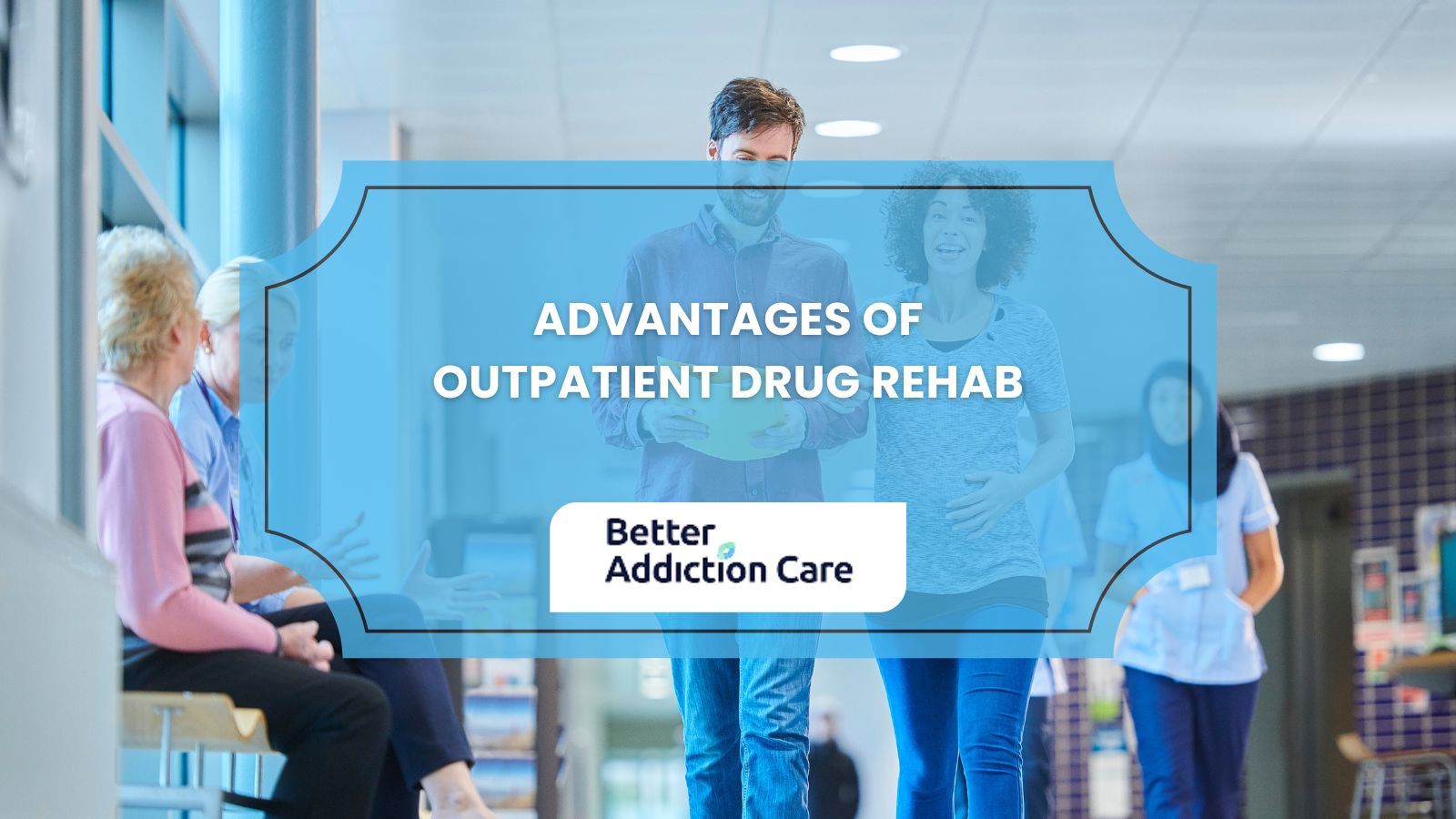
Outpatient programs have grown in popularity, with 6,089 programs in the U.S. as of 2011, making up 44% of all addiction treatment facilities and serving over 141,000 patients annually, as per McCarty, D.’s 2014 study, ‘Substance abuse intensive outpatient programs: assessing the evidence’.
Common outpatient treatment programs include traditional outpatient programs and intensive outpatient programs, providing structured support and therapy while allowing clients to maintain their daily responsibilities.
Here are the key advantages of outpatient drug rehab in detail:
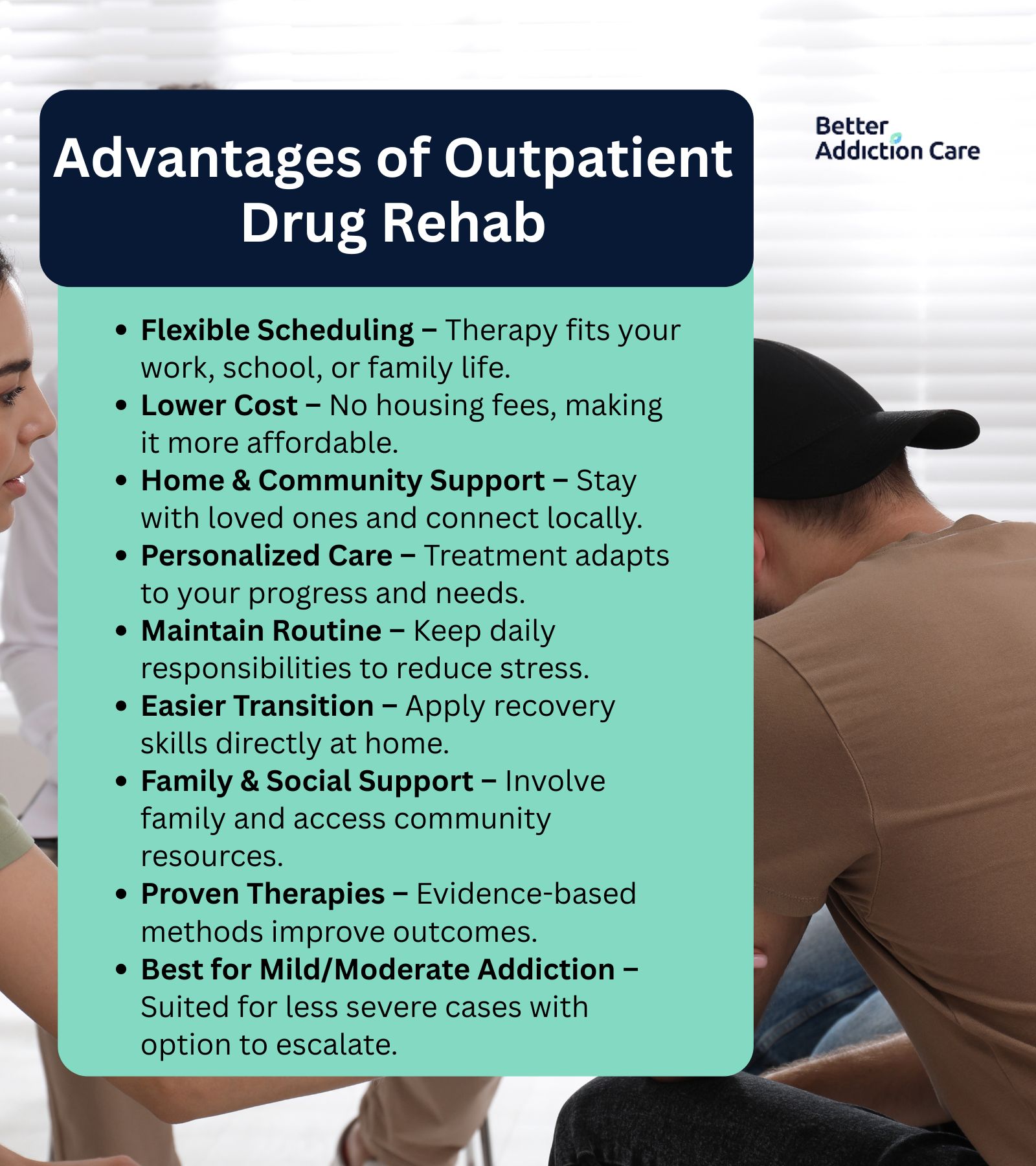
Flexible Scheduling
Outpatient programs offer therapy at times that accommodate work, school, or family responsibilities. Attendance takes place at community clinics on predetermined days. This structure preserves daily obligations without sacrificing treatment consistency.
Lower Cost
Outpatient treatment reduces expenses by eliminating residential fees for lodging and meals. Clients incur charges only for therapy sessions and medical consultations. This model lowers financial barriers without compromising clinical quality. According to DATCAP data, non-methadone outpatient programs average $140 per week compared to $789 per week for adult residential treatment.
Home & Community Support
Remaining at home ensures sustained encouragement from family and friends throughout recovery. Participation in local support groups strengthens accountability and builds connections with peers in similar situations. These networks bolster motivation during challenging periods.
Personalized Care Plans
Outpatient rehab offers customized treatment based on individual assessments and recovery goals. Therapy intensity adjusts as progress is made, ensuring care stays relevant and effective. This personalized approach targets the specific causes of substance use, leading to more focused and lasting results.
Maintain Routine
Outpatient rehab allows individuals to keep their daily routines, reducing stress from major life disruptions. Clients continue with work, school, and family responsibilities while attending treatment.
This stability helps integrate healthy habits into real-life settings, making recovery more sustainable and aligned with everyday life.
Easier Transition Home
Step-down from formal treatment to independent living occurs smoothly with outpatient support. Skills learned during therapy apply directly to real-world scenarios. This progression enhances confidence and lowers relapse risk after program completion.
Family & Social Support
Family support is a key strength of outpatient rehab, as clients stay at home and involve loved ones in the recovery process. Family therapy improves communication, rebuilds trust, and addresses unhealthy dynamics that contribute to substance use. Outpatient programs also connect individuals to community resources like sober living homes, support groups, and job training, extending support beyond treatment sessions and reinforcing long-term recovery.
Proven Therapies
Outpatient clinics deliver evidence-based interventions including cognitive behavioral therapy, motivational interviewing, and relapse prevention. Group counseling facilitates peer feedback and shared learning. Clinical data demonstrate significant improvements in sobriety outcomes.
Ideal for Mild to Moderate Addiction
Individuals with lower severity substance use disorders benefit most from outpatient care. Medical evaluation confirms appropriateness and identifies needs for possible escalation to more intensive programs. This approach reserves residential treatment for individuals with complex or high-risk profiles.
When Is Outpatient Rehab the Right Choice?
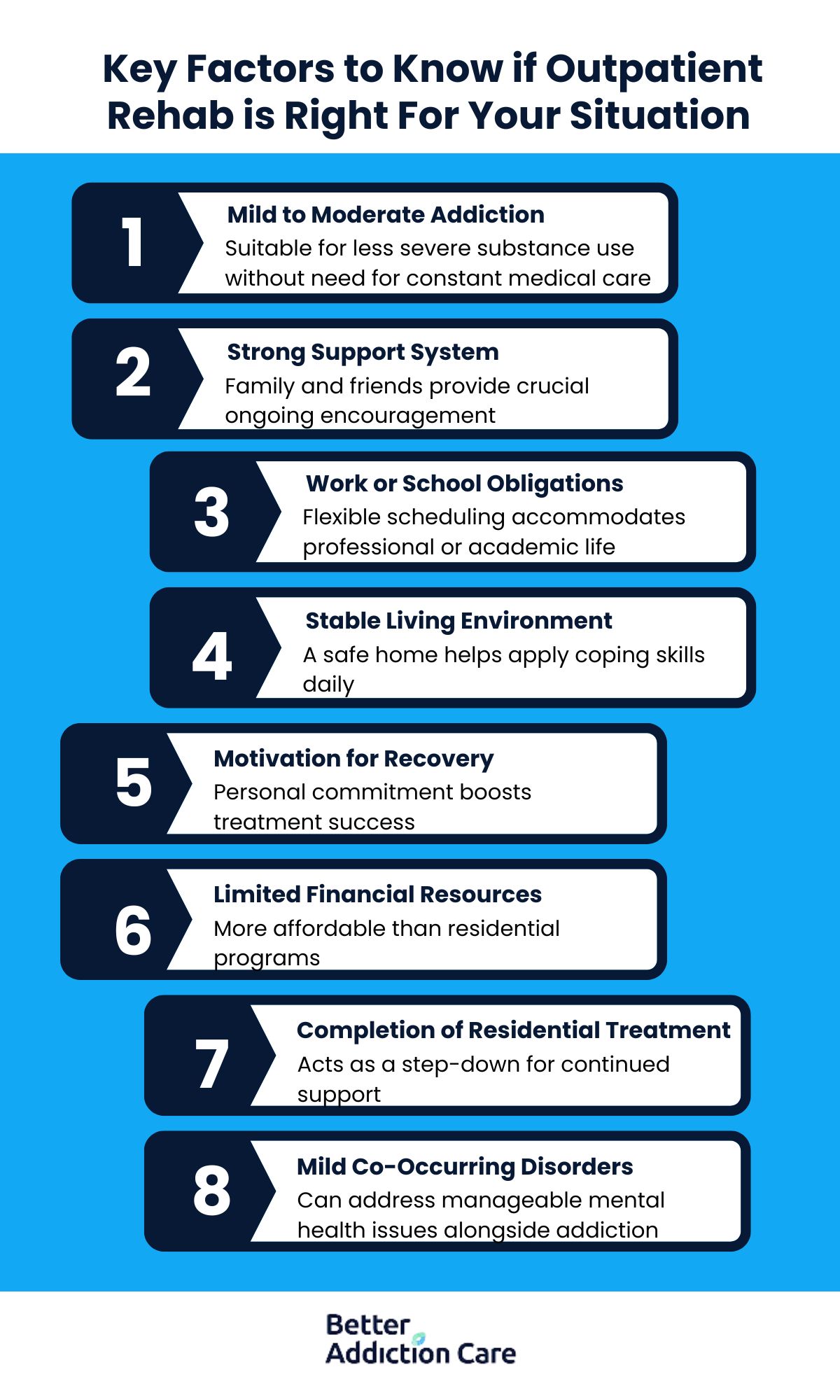
Outpatient rehab is the right choice when addiction levels are manageable, strong support networks are in place, work or school commitments need accommodation, home environments offer stability, personal motivation runs high, affordable treatment options are preferred, or previous residential care requires follow-up support.
Here are the key factors to know if outpatient rehab is right for your situation:
-
Mild to Moderate Addiction: Outpatient treatment suits individuals whose substance use disorders remain at a mild to moderate level and do not require continuous medical supervision. This approach addresses misuse behaviors while allowing the continuation of daily routines.
-
Strong Support System: A robust network of family, friends, or community peers reinforces therapeutic strategies and sustains positive behavior change throughout the recovery process.
-
Work or School Obligations: Flexible scheduling ensures that therapy appointments integrate seamlessly with professional or academic commitments, preserving career and educational progress.
-
Stable Living Environment: Residing in a safe, supportive home setting enables immediate application of coping skills and promotes consistency between treatment and everyday life.
-
Motivation for Recovery: High personal commitment and active participation in sessions drive meaningful progress and foster lasting transformation.
-
Limited Financial Resources: The reduced expense of outpatient programs lowers financial obstacles compared with residential treatment, broadening access to essential care.
-
Completion of Residential Treatment: Serving as a step-down level of care, outpatient services reinforce recovery skills and support reintegration after residential stays.
-
Mild Co-Occurring Disorders: Individuals experiencing manageable conditions such as moderate anxiety or depression benefit from outpatient services that address both substance use and mental health in an ambulatory setting.
What Are The Types of Outpatient Rehab?
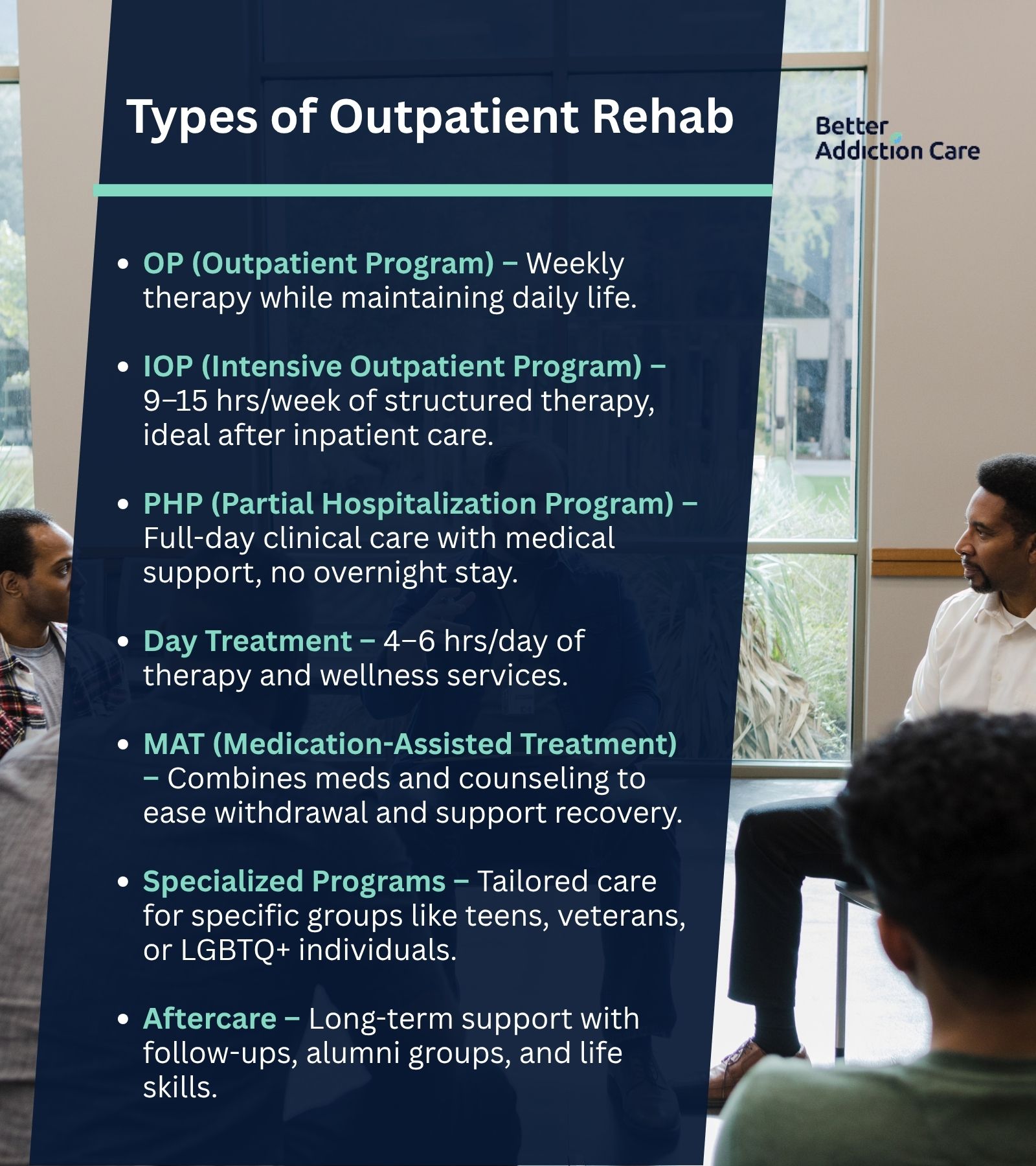
The types of outpatient rehab include traditional outpatient programs, intensive outpatient programs, partial hospitalization programs, day treatment programs, medication-assisted treatment programs, specialized outpatient programs, and continuing care and aftercare programs. These diverse treatment options provide varying levels of clinical support and therapeutic intervention while allowing individuals to maintain their daily responsibilities and living situations.
Some common examples of outpatient rehabilitation programs are as follows:
-
Traditional Outpatient Programs (OP): A nonresidential treatment model that delivers weekly or biweekly therapy sessions. Clients participate in group counseling, individual meetings, and educational workshops for three to four hours per visit. Licensed clinicians guide cognitive and behavioral interventions while clients maintain employment and family responsibilities. Treatment emphasizes relapse prevention planning, coping skill development, and peer support within a community clinic setting.
-
Intensive Outpatient Programs (IOP): A structured program requiring nine to fifteen hours of treatment per week without overnight stay. Participants engage in group therapy, individual counseling, relapse prevention education and family sessions designed to rebuild trust. Intensive outpatient programs support a gradual transition from higher levels of care back into daily life.
-
Partial Hospitalization Programs (PHP): A day-treatment approach that provides six to eight hours of clinical care each weekday. Clients receive medical monitoring, multidisciplinary therapies such as trauma-informed care and dialectical behavior therapy, and medication management before returning home each evening. Partial Hospitalization Program delivers hospital-grade intensity without residential admission.
-
Day Treatment Programs: A daytime regimen that combines therapeutic activities, wellness coaching and medical oversight for four to six hours, five days per week. Holistic services such as nutritional counseling, exercise physiology and mindfulness training support recovery. Patients implement skills immediately in their living environments, reinforcing real-world application of treatment insights.
-
Medication-Assisted Treatment (MAT) Programs: An integrated model that pairs FDA-approved medications with behavioral therapies to address both physiological dependence and psychological triggers. During medication-assisted therapy Clients receive dosage supervision, regular medical evaluations and individualized counseling. This dual approach reduces withdrawal symptoms and strengthens engagement in therapy.
-
Specialized Outpatient Programs: Tailored tracks that serve distinct populations or clinical needs, such as adolescents facing peer pressure, veterans processing trauma, LGBTQ+ individuals encountering unique stressors or clients with co-occurring mental health disorders. Specialists design customized curricula to address cultural, developmental or diagnostic factors and enhance treatment relevance.
-
Continuing Care and Aftercare Programs: A long-term support framework that provides scheduled follow-up sessions, alumni support groups and skills workshops for six to twelve months post-treatment. This phase reinforces coping strategies, monitors progress and connects participants with community resources such as sober living homes and vocational training to solidify recovery gains.
What Are The Advantages Of Outpatient Rehab Over Inpatient Rehab?
The advantages of outpatient rehab over inpatient rehab include lower costs, flexible scheduling that allows for preservation of work or school commitments, the immediate application of coping skills in daily life, strong support from family and peers, and a smoother transition from residential care.
However, according to Nagy, N. E. S.’s 2022 study, ‘Assessment of addiction management program and predictors of relapse among inpatients of the Psychiatric Institute at Ain Shams University Hospital, ’ outpatient programs had higher relapse rates (56%) compared to inpatient programs (45.33%).
How Can You Find Local Outpatient Drug Rehabs That Suit Your Needs?
To find local outpatient drug rehabs that suit your needs, begin by clarifying your treatment goals, daily schedule constraints, and support network requirements. Research facility accreditation, treatment approaches, and staff qualifications through official state health department listings and professional directories. Ask healthcare providers or trusted peers for personal recommendations, then verify that each program offers evidence-based therapies and aligns with your logistical and clinical priorities.
At Better Addiction Care, we simplify this process with our durg rehab locator. Our locator lets you filter nearby outpatient centers by program type, hours of operation, and accepted insurance plans. Use our tool to compare multiple options, schedule an intake consultation, and obtain a clear outline of services and fees before making your final decision.
Related Articles
Treatment Centers in New Jersey
 123
123
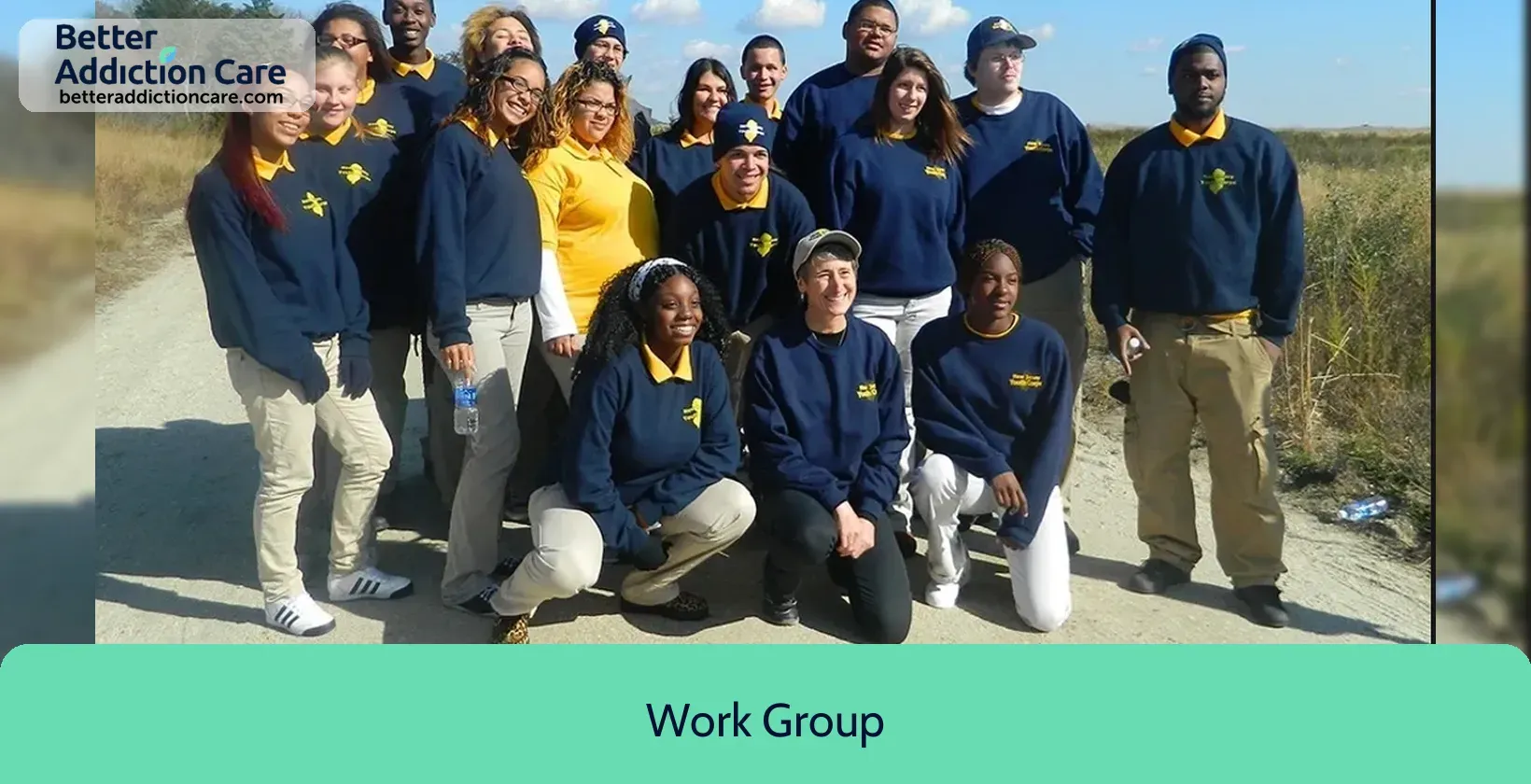 123
123
 123
123





